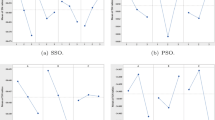Abstract
For the purpose of solving the dynamic flexible job-shop scheduling problem, this paper establishes the mathematical model to minimize the makespan and stability value, an improved double chains quantum genetic algorithm was proposed. Firstly, it is proposed that the method of double chains structure coding including machine allocation chain and process chain. Secondly, it is proposed that non- dominated sorting based on the crowding distance selection strategy. Thirdly, the most satisfying solution is obtained through the multi-attribute grey target decision model. Finally, the novel method is applied to the Brandimarte example and a dynamic simulation, the result of comparing with other classical algorithms verifies its effectiveness.


Similar content being viewed by others
References
Bagheri A, Zandith M, Mahdavi I, Yanzdanni M (2010) An artificial immune algorithm for the flexible job-shop scheduling problem. Future Gener Comp Syst 26(4):533–541
Brandimarte P (1993) Routing and scheduling in a flexible job shop by tabu search. Ann Oper Res 41(3):157–183
Bucker P, Schlie R (1990) Job-shop scheduling with multi-purpose machines. Computing 45(4):369–375
Fattahi P, Fallahi A (2010) Dynamic scheduling in flexible job shop systems by considering simultaneously efficiency and stability. CIRP J Manuf Sci Technol 2(2):114–123
Ishibuchi H, Murata T (1998) A multi-objective genetic local search algorithm and its application to flow shop scheduling. IEEE Trans Syst Man Cybern Part C Appl Rev 28(3):392–403
Jackson J R (1957) Simulation research on job shop production. Naval Res Logist Q 4(3):287–295
Kacem I, Hammadi S, Borne P (2002) Approach by localization and multi-objective evolutionary optimization for flexible job-shop scheduling problems. IEEE Trans Syst Man Cyb C 32(1):1–13
Liu X, Zhang G (2014) Flexible job shop dynamic scheduling method research. Mach Des Manuf 5:250–252+256
Liu A, Yang Y, Xing Q et al (2011) Multi-population genetic algorithm in multi-objective fuzzy and flexible Job Shop scheduling Dynamic scheduling on multi-objective flexible Job Shop. Comput Integr Manuf Syst 17(9):1954–1961
Liu X, Jiao X, Ning T et al (2014) Improved method of flexible Job Shop scheduling based on double chains quantum genetic algorithm. Comput Integr Manuf Syst 7(12):1–11
Ning T, Guo C, Chen R et al (2016a) A novel hybrid method for solving flexible job-shop scheduling problem. Open Cybern Syst J 10:13–19
Ning T, Huang M, Liang X et al (2016b) A novel dynamic scheduling strategy for solving flexible job-shop problems. J Ambient Intell Humaniz Comput 25(7):721–729
Pezzella F, Morganti G, Ciaschetti G (2008) A genetic algorithm for the flexible job-shop scheduling problem. Comput Oper Res 35(10):3202–3212
Rahmat SHA, Zandieh M, Yazdani M (2013) Developing two multi-objective evolutionary algorithms for the multi-objective flexible job shop scheduling problem. Int J Adv Manuf Technol 64(5):915–932
Shi J, Jiao H, Chen T (2012) Multi-objective Pareto optimization on flexible job-shop scheduling problem about due punishment. J Mech Eng 48(12):188–196
Tang J (2012) Research of scheduling problems based on hybrid evolutionary algorithm. South China University of Technology, Guangzhou
Wang S, Zhang C, Liu Q et al (2014) Dynamic scheduling of flexible job shop based on different rescheduling cycle. Comput Integr Manuf Syst 7(14):1–14
Yang K, Liu X (2009) Multi-objective optimization for flow shop scheduling with the group technology assumption removed. Comput Integr Manuf Syst 2:348–357
Zhang L (2013) Research on theories and methods for dynamic job shop scheduling based on predictive-reactive scheduling. Huazhong University of Science and Technology, Wuhan
Zhang J, Wang W, Xu X et al (2012) Hybrid particle-swarm optimization for multi- objective flexible job-shop scheduling problem. Control Theory Appl 29(6):30–37
Zhang L, Gao L, Li X (2013) A hybrid genetic algorithm and tabu search for a multi-objective dynamic job shop scheduling problem. Int J Prod Res 51(12):3516–3531
Acknowledgements
This work is financially supported by the National Natural Science Foundation, China (No. 51579024), Liaoning Provincial Natural Science Foundation of China (No. 201602131), Dr scientific research fund of Liaoning Province (No. 201601244), Liaoning Provincial Social Science Planning Foundation of China (No. L16BGL008) and Dalian Social Science Foundation of China (2016dlskyb104).
Author information
Authors and Affiliations
Corresponding author
Rights and permissions
About this article
Cite this article
Ning, T., Jin, H., Song, X. et al. An improved quantum genetic algorithm based on MAGTD for dynamic FJSP. J Ambient Intell Human Comput 9, 931–940 (2018). https://doi.org/10.1007/s12652-017-0486-4
Received:
Accepted:
Published:
Issue Date:
DOI: https://doi.org/10.1007/s12652-017-0486-4




